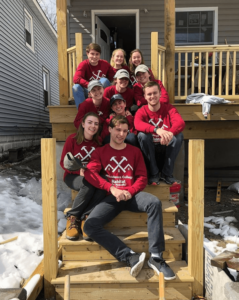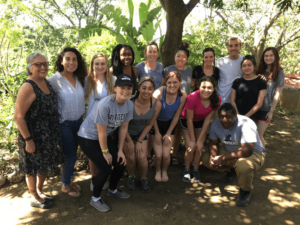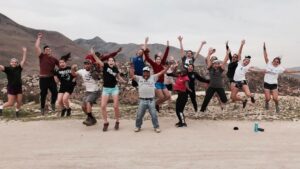by The Cowl Editor on March 15, 2018
Features
by Alexandra Huzyk ’20
News Staff

Providence College’s chapter of Habitat for Humanity, a global nonprofit housing organization, sent nine groups of students over spring break to help build affordable homes in locations across the East Coast.
Gaby DeParis ’18, the president of the College’s Habitat for Humanity chapter, shareD that she has been going on trips since her freshman year at PC. “I have such a passion for the organization and everything they stand for, and I love how hands-on the work is.”
DeParis shareD that her most recent trip to Bridgeport, Connecticut, was her favorite trip out of her four years with the program. “My favorite part of it, besides the amazing people I was able to work with, was meeting the future homeowners of the houses we were working on throughout the week,” SAID DeParis. She loved to hear their stories and said that it was amazing to feel the gratitude that they have for both the Habitat for Humanity organization and its volunteers.
“I went to Rockport, Maine,” said Emily King ’20. “My favorite part was definitely getting to know all of the people on the trip so well.” King also says that because her group never met the family of the home she was building, she expanded her personal meaning of service. “We completed our work, not to be thanked by anyone, but simply to help,” King said.
Emily Smith ’20, another first-time Habitat volunteer, said, “My group went to Kittanning, Pennsylvania, which is a pretty unique site because different churches in the area host you for dinner every night and allow you to interact with a lot of people from the community.” Smith shared that her group was able to bond very closely both amongst themselves and with the family that they were helping build a house for. “They had shared the story of their youngest son, Toby, who was diagnosed with brain cancer but luckily his tumor had shrunk,” said Smith. “He gave us all bracelets he made that said ‘Tuff Like Toby,’ so I’ll always remember that family and have them in my prayers.”

Over this past spring break, some Providence College students traveled to soak up the sunshine while others opted for an alternative type of trip. Students at the College currently taking the Global Studies class titled “Global Border Crossing” traveled to Mexico, while students in the class titled “Foreign Aid,” a separate Global Studies course, traveled to Nicaragua to study the complexities of foreign aid.
To further their studies of borders around the world, students in the “Global Border Crossing” course traveled to Tijuana, Mexico to work with an organization named Esperanza. Adrianna Perry ’20 says, “Esperanza, which means hope in Spanish, works to provide homes for low income families, while creating community in the process.” Perry shares that she decided to take this course out of concern for current foreign affairs and to learn more about U.S. immigration policies. Over the course of the week, students helped to create the foundations of new homes, visited the border wall named Friendship Park, and visited a health clinic treating people without health insurance. Delina Auciello ’18, a returner and a co-leader of the trip, adds that they also visited La Casa de Migrantes, where students, “spoke and shared dinner with migrants who have recently been deported or are looking to try to cross the border.”
Auciello says that the first part of a Global Service Learning Trip is to learn in class about the place you are traveling to, “then you are able to take this trip with a group of people you have been building relationships with over the semester and have this intense experience listening and telling stories, carrying narratives and challenging experiences back with you.”
“My favorite part of the trip was getting to see how much faith the people of Mexico have in Esperanza to provide for their needs,” despite their lack of funding, says Perry. Perry also shares that, “The most disheartening thing that I witnessed while in Tijuana were the eight prototypes for the border wall that have been created by six different contractors in Mexico.” Perry feels that we must work to change the narratives that migrants are not human in order to combat current and future immigration policies. Meghan O’Connor ’18 says, “the big takeaway for me was that the border is not just a political issue but something deeply personal and divisive and is directly hurting and impacting families and communities.”
Nicaragua was the destination of students in the “Foreign Aid” course. The class focuses on the impact of foreign aid. Students stayed in the area of Masaya and were hosted by a sustainable tourism business that is named La Mariposa. This organization, Daniela Miranda ’19 says, “is a Spanish school that hires Nicaraguan locals to teach Spanish,” but it also “functions as an eco-hotel and has multiple projects including a center for mentally and physically disabled children, an organic garden, animal rescue, and children’s programs.”
Sara Murphy ’20, another student who traveled to Nicaragua, says, “we learned about how different aid agencies and structures affect Nicaragua and the United States,” through visiting various grassroots organizations and NGOs. Miranda adds, “we traveled to Granada for an afternoon, went on an evening hike, took a salsa class, and walked through el Mercado Oriental, the largest market in Central America.”
Murphy recalls that the country itself was beautiful and that she will remember “the spirit of the people and the amazing sense of community we encountered.” As a business major, Miranda says that her favorite part of the trip was talking with a woman named Paulette, who is the owner of La Mariposa. “She wanted to build a sustainable business to create jobs and stimulate the local economy,” says Miranda, “I admired her desire to empower the locals by giving them something to call their own.”
